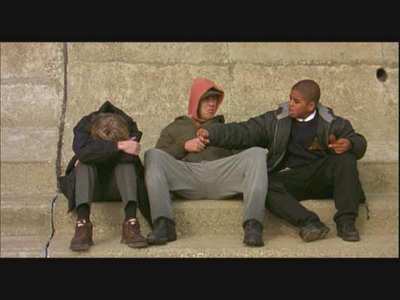Review of A Room For Romeo Brass
Introduction
It’s Brit-tragi-comic-social-realism time once again, this time courtesy of Shane Meadows, who previously plumbed a similar tone and milieu in the acclaimed ‘TwentyFourSeven’. In this semi-autobiographical tale, Romeo (Andrew Shim) and Knock Knock (Ben Marshall) are life-long best friends whose relationship is put under considerable strain thanks to a run in with local oddball Morell (Paddy Considine), an eccentric layabout who strikes up a report with Romeo, to the detriment of his friendship with Knock Knock. It quickly becomes clear however that Morell isn’t the hapless, harmless deviant he appears to be, but that darker forces are lurking beneath his pitiful exterior.

Video
Competent, if hardly dazzling 1:1.85 widescreen transfer. There’s little visual interest to be found in the film, but the transfer is fairly typical of films from low-budget origins. Non anamorphic.

Audio
Only stereo but the dialogue and eclectic soundtrack are well presented.

Features
The Director’s Video Diary promises a lot but delivers only 3 minutes of silent footage edited into a rather abstract behind-the-scenes pop-video. The commentary with Meadows and Considine is funny and endearing with Meadows ably fulfilling his role as raconteur while Considine makes countless s*** and w*** gags. Also included is the theatrical trailer, which emphasizes the film’s comedic elements.

Conclusion
It seems that any film partly funded by the Arts Council invariably comes under unfairly close scrutiny; this, coupled with the absurdly over-stated acclaim granted to his debut and it becomes unsurprising that ‘A Room for Romeo Brass’ was considered a disappointment by the critics. Admittedly, it is hardly stunningly realized, but it is generally well-performed and has a certain tang of authenticity most coming-of-age dramas seem wont to avoid.
The film drops an alarming narrative bombshell 30 minutes in that throws the whole salt-of-the-earth feelgood aesthetic into a tailspin. It’s a welcome reversal, but the narrative struggles both to adapt to the new heightened atmosphere of tension and palpable danger and to balance its plot-driven narrative with its obvious fixation on slice-of-life dynamics. That said, newcomer Considine is creepy and disturbingly believable as the twisted Morell.
The balance of humor and serious drama has become a tiresome cliché in British films, but Meadows handles the contrast with some skill. However, any interrogation of the film’s crucial sub-themes (fathers and sons, mixed-race families, mental illness and familial apathy) is conspicuous by its absence. The film focuses almost entirely on the rather conservative and sentimental notion of eternal-friendship, with Romeo recoiling into an artifice of permanent comfort when new challenges faze him. Still, an enjoyable, slight, if rather too worthy and hollow film.
Your Opinions and Comments
Be the first to post a comment!